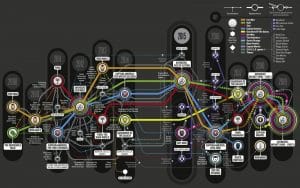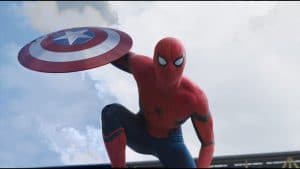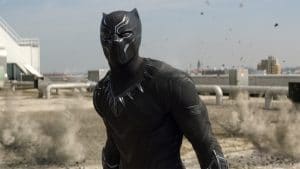Did you know that Captain America: Civil War is the 13th movie in the Marvel Cinematic Universe (MCU)? It’s the 3rd film in Marvel’s Captain America series, but it’s as much a sequel to the last Avengers movie as is is to the 2nd Captain America movie.
And Civil War is an excellent movie (I’d give it 132 out of 100 tomatoes, but that’s just me). It’s exciting, funny, and dramatic, doing so while balancing a cast of about a 9,000 superheroes. By all measures, it should have been a hot mess, but it’s a worldwide commercial and critical hit.
How is Marvel consistently putting out quality flicks that use multiple characters across the films, while also spanning multiple genres and creative teams? Did the MCU make a deal with Mephisto? If so, could they ask him to undo Brand New Day?
How Marvel Built Such an Impressive Movie Universe: The Strategy
 Well, let’s talk about the Marvel Cinematic Universe. The MCU is structured more like a serialized television show than a collection of movie sequels. It’s as much a management challenge as a narrative one.
Well, let’s talk about the Marvel Cinematic Universe. The MCU is structured more like a serialized television show than a collection of movie sequels. It’s as much a management challenge as a narrative one.
The MCU being something of a television show is a concept that was first proposed by Vox’s Todd VanDerWerff who described the MCU as “Marvel’s idea of essentially creating a giant TV show that we all tune in to every six months or so.”
There just isn’t a model for a story so big, and with so many characters. But if you squint up your eyeballs, you can see a little bit of the same thing in HBO’s sprawling epic fantasy Game of Thrones. GoT similarly has dozens of characters that crisscross over multiyear storylines. The MCU just takes it all next level.
But the biggest similarity between the two is how both the MCU and Game of Thrones assumes a commitment from their audiences. GoT doesn’t spend tons of time with recaps at the beginning of each episode. They simply roll with the fact that viewers might be a little lost, knowing that light bulbs will go off for the audience as the story unfolds.
The MCU does likewise. They don’t spend the first 30 minutes of every movie with a recap of the previous movies and characters. They simply jump into a good time, knowing the audience isn’t going anywhere. This commitment to the audience has allowed them to tell a huge, sprawling story over a dozen movies with no end in sight.
The idea of a sprawling, interconnected universe has decades of history in the comics, but t’s new to the movie industry, and has made the MCU the envy of Hollywood. Not only do they reliably produce billion dollar films each year but the MCU also promises a series of bankable films for years to come. In my estimation, Marvel has enough superheroes for 6,400 years worth of movies.
But what can’t be overstated is how hard Marvel has had to work for this audience commitment. Early on, Marvel had to deliver the goods for viewers, and do that every. single. time. Every Marvel movie has to be at least pretty good, and often great. Which is not only why other studios haven’t quite been able to ape the formula, but also why Marvel is gaining more and more freedom to be even more ambitious and expansive in their storytelling. The MCU has ran away from the pack.
This consistency is due in no small part to the way that Marvel develops its movies, planning multiple films years in advance, treating each story as an episode in a grander story.
The Chief Architects of the Marvel Cinematic Universe
So who are the architects of the Marvel Cinematic Universe? Let’s meet the major players.
 Since the release of Iron Man in 2007, the in-house Marvel Studios (which was bought by Disney in 2009 for less money than Civil War grossed) has run all of the superhero films based on its various characters through Kevin Feige, the man who oversees the entire film slate.
Since the release of Iron Man in 2007, the in-house Marvel Studios (which was bought by Disney in 2009 for less money than Civil War grossed) has run all of the superhero films based on its various characters through Kevin Feige, the man who oversees the entire film slate.
Fiege, acting as a singular point of creative control, has allowed the studio to coordinate and develop a larger cast of characters and interconnected storylines in ways that no other movie studio had ever really attempted before. Siege oversees the story’s narrative sprawl that are drawn out over the course of multiple films released many years apart.
But even as Fiege represents how Marvel Studios is streamlined, the screenwriting duo of Stephen McFeely and Christopher Markus represent how incredibly collaborative it is. In addition to penning Civil War, they created Marvel’s TV spinoff series, Agent Carter, worked on the scripts for the previous two Captain America movies and Thor: The Dark World, and now they are in the process of writing Avengers: Infinity War.
It is safe to say that McFeely and Markus are the senior architects of the MCU.
Interestingly, McFeely and Markus compare the process of developing a Marvel movie to the process of pitching a story in a TV writers’ room. They state that each film begins with a two-month brainstorming session, during which they’ll be joined by typically by Fiege and directors such as Anthony and Joe Russo, the brother team who directed the last two Captain America movies and are up next with the next two Avengers movies.
McFeely and Markus bounce ideas back and forth in an open-ended manner, with Marvel giving them a fair amount of freedom to develop the story as they see fit, with few (if any) guidelines or requests as the process begins. These brainstorming sessions are where the three act story is created.
It’s unusual for their ideas to be shot down, and then typically only for reasons around the legal rights of a character. (When Marvel was bankrupt over a decade ago, the had to sell a portion of their character rights to Fox, Sony, and Universal in order to stay afloat.)
 When Markus and McFeely started working on Civil War, for example, Marvel had not yet finalized a deal with Sony to bring back the rights to Spider-Man. That meant they had to start writing without knowing whether he would end up in the final script — and thus had to build a story that would allow him to be replaced if necessary. Then when it was clear that Civil War was where Spidey would make his MCU debut, the writing duo nailed it.
When Markus and McFeely started working on Civil War, for example, Marvel had not yet finalized a deal with Sony to bring back the rights to Spider-Man. That meant they had to start writing without knowing whether he would end up in the final script — and thus had to build a story that would allow him to be replaced if necessary. Then when it was clear that Civil War was where Spidey would make his MCU debut, the writing duo nailed it.
There are of course the inevitable hiccups and complications that happen anytime you bring multiple people into a creative process, particularly while sticking to release schedules that are announced years in advance, usually at high-profile events. But these are mostly just the challenges of working on any expensive, complex project, and of working with other people.
And Markus and McFeely argue that the cross-film coordination with other filmmakers helps prevent the movies from falling into a creative rut, because contributions from other writers and directors help keep the characters fresh and supply the system with new ideas.
 Even though it’s a tightly-controlled process, it never feels like Marvel movies are cranked out of a factory. One year you might the far-out space opera of Guardians of the Galaxy, then it’s followed up by an espionage flick like Winter Soldier.
Even though it’s a tightly-controlled process, it never feels like Marvel movies are cranked out of a factory. One year you might the far-out space opera of Guardians of the Galaxy, then it’s followed up by an espionage flick like Winter Soldier.
Regardless, I just hope they keep it up. 7-year-old me never dreamed I’d see Groot and Rocket Raccoon on a movie screen one day, and Captain Marvel, Doctor Strange, and Black panther are poised on the horizon. That’s worth the price of a bucket of popcorn.

